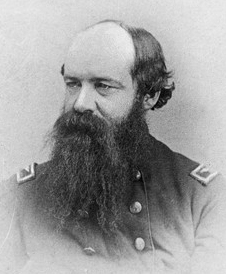James Chatham Duane facts for kids
Quick facts for kids
James C. Duane
|
|
|---|---|

James Chatham Duane
|
|
| Born | June 10, 1824 Schenectady, New York |
| Died | December 8, 1897 (aged 73) New York City, New York |
| Allegiance | United States of America Union |
| Service/ |
United States Army Union Army |
| Years of service | 1848–1888 |
| Rank | Brigadier General |
| Commands held | US Army Corps of Engineers |
| Battles/wars | Utah War American Civil War |
| Spouse(s) | Harriet Whitehorne Brewerton |
| Relations | James Duane (great-grandfather) |
James Chatham Duane (born June 10, 1824 – died December 8, 1897) was an important engineer in the Union Army during the American Civil War. He was the main engineer for the Army of the Potomac, a major Union army.
Contents
Early Life and Education
James Chatham Duane was born on June 10, 1824, in Schenectady, New York. His parents were James Duane and Harriet Constable. His great-grandfather, James Duane, was a famous person. He was a member of the Continental Congress and even served as mayor of New York City.
James C. Duane went to Union College and graduated in 1844. While there, he helped start the Chi Psi fraternity. After that, he attended the United States Military Academy (West Point). He graduated in 1848, ranking third in his class. This showed he was very smart and skilled.
Military Career and Achievements
After graduating, Duane became an officer in the United States Army Corps of Engineers. From 1852 to 1854, he taught military engineering at West Point. During this time, Robert E. Lee was the superintendent of the academy.
Before the American Civil War, Duane worked with a special group of engineers. They were called sappers, miners, and pontoniers. These engineers built bridges, dug trenches, and handled explosives. In 1858, he led engineers on a long 1,100-mile journey during the Utah War. In 1861, he commanded a group of engineers who protected President Abraham Lincoln at his inauguration.
Key Contributions During the Civil War
Duane played a vital role during the Civil War. In 1862, he built the first military pontoon bridge over the Potomac River. This was during the Battle of Harpers Ferry. Pontoon bridges are temporary bridges made of floating sections. They are crucial for armies to cross rivers quickly.
From 1863 to 1865, Duane served as the Chief Engineer of the Army of the Potomac. This was a very important job. In 1864, he achieved a remarkable feat. In just seven hours, he built the longest pontoon bridge of the Civil War. This bridge was 2,170 feet long and crossed the James River.
Post-War Service and Retirement
After the war, President Andrew Johnson recognized Duane's excellent service. In 1866, Duane was promoted to brevet brigadier general. This was a special honor for his wartime achievements.
From 1866 to 1868, Duane commanded engineers at Willets Point, New York. For the next ten years, he worked on building strong fortifications. These defenses were along the coasts of Maine and New Hampshire. He continued to rise in rank, becoming a lieutenant colonel in 1867 and a colonel in 1883.
Duane became the Chief of Engineers for the U.S. Army in 1886. He retired from the army on June 30, 1888. After his military career, he became a Commissioner for the Croton Aqueduct in New York City. This aqueduct was important for bringing water to the city. He also wrote a paper about the history of bridge equipment in the U.S. Army.
Personal Life
James Chatham Duane married Harriet Whitehorne Brewerton in 1850. They had three children together:
- James Duane (1852–1899)
- Charles Duane (1856-?)
- Alexander Duane (1858-?)
General Duane passed away in New York City on December 8, 1897. He was buried in Vale Cemetery in Schenectady, New York.
 | DeHart Hubbard |
 | Wilma Rudolph |
 | Jesse Owens |
 | Jackie Joyner-Kersee |
 | Major Taylor |

